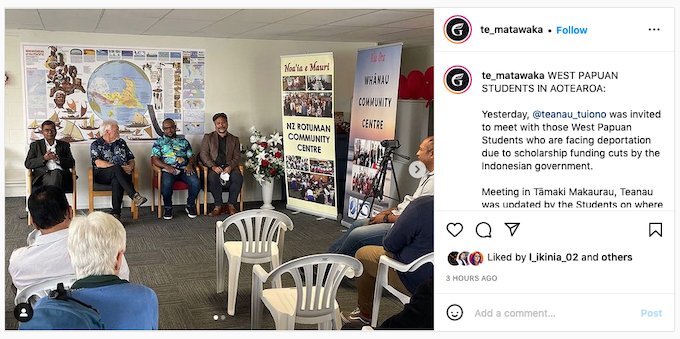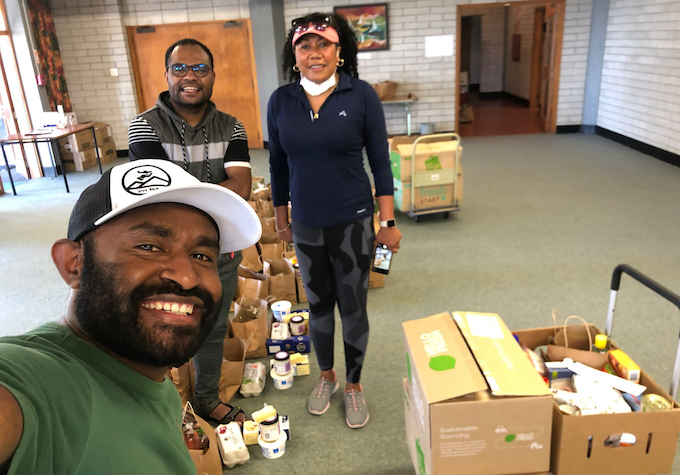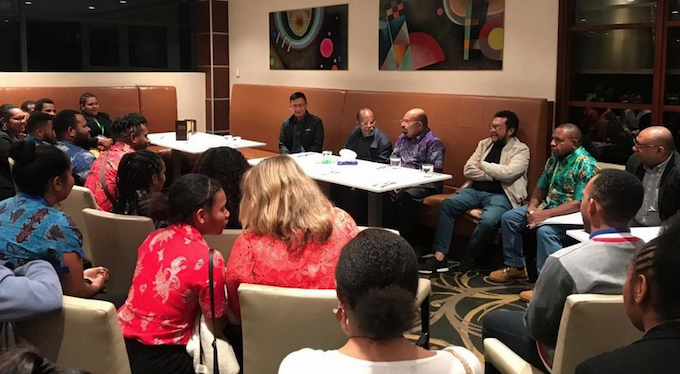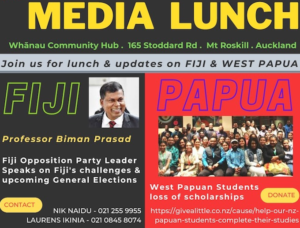Asia Pacific Report newsdesk
West Papuan students stranded in Aotearoa New Zealand by an abrupt cancellation of their Indonesian government scholarships earlier this year while trying to complete their degrees and diplomas can breathe mire easily with the latest news.
It is understood they have been told by Immigration New Zealand that they will not be deported while New Zealand is considering their plight.
After weeks of advocacy by Green MPs, an immigration team will now be formed to assess the future needs of the students.
“The Green Party has been calling on the government to do its part to support the indigenous communities of West Papua and we’re pleased that action is being taken,” said Teanau Tuiono, Green Party spokesperson for Pacific Peoples.
Tuiono — along with Papuan student spokesperson Laurens Ikinia, Professor David Robie, editor of Asia Pacific Report, and opposition National Federation Party leader Professor Biman Prasad, a former academic at the University of the South Pacific — addressed a seminar about the issue at the Whānau Community Hub in Auckland yesterday.
Ikinia welcomed the news that none of the Papuan students would be deported and praised the community support that they were receiving in New Zealand.
“Dozens of West Papuan students are facing hardship and the prospect of not being able to finish their studies due to the cancellation of their scholarship by the Indonesian government,’ Tuiono said in a statement.

Requested urgent action
“We wrote to [Immigration Minister Kris] Faafoi asking him to act urgently to issue new visas for the students of West Papua.
“We are pleased that government agencies are taking action to assess the needs of the West Papuan students and ideally grant them renewed visas for them to remain in Aotearoa.
“West Papuans are indigenous peoples who have been occupied by Indonesia. As a Pacific nation and signatory of the United Nations Declaration on the Rights of Indigenous Peoples we have a responsibility to support West Papuans and their struggle for self-determination.
“Supporting students to come to Aotearoa to study and to stay is a tangible way we can do our part to support the people of West Papua,” Tuiono said.
Dr Robie published an open letter in Asia Pacific Report yesterday appealing for help from the minister for the 34 students in New Zealand, ranging from masters degree and diploma students to one high school student.
“They must finish their studies here in New Zealand because returning home to a low wage economy, high unemployment, the ravages of the covid-19 pandemic, and an insurgency war for independence will ruin their education prospects,” he said.
“Papuan students studying in Australia and New Zealand face tough and stressful challenges apart from the language barrier.”
The open letter added:
“Minister Faafoi, surely New Zealand can open its arms and embrace the Papuan students, offering them humanitarian assistance, first through extended visas, and second helping out with their financial plight.”
Alarming human rights abuses
Ricardo Menéndez March, Green Party spokesperson for immigration said:
“The ongoing alarming reports of human rights abuses in West Papua, mean the students could have been forced to return to their homelands without the security and tools they need to support their communities”
“The government has shown us that where there is political will we can guarantee certainty and security for temporary visa holders.
“The prompt issuing of the Ukraine Special Visa and the renewal of up to 19,500 working holiday visas demonstrate there are levers the Minister of Immigration can pull to guarantee a safe pathway to remain in Aotearoa for students from West Papua.
“We are calling on the government to guarantee replacement visas for the West Papuan students and to explore setting up a scholarship fund to do our part supporting indigenous peoples in the Pacific,” said Menéndez March.

This post was originally published on Asia Pacific Report.

